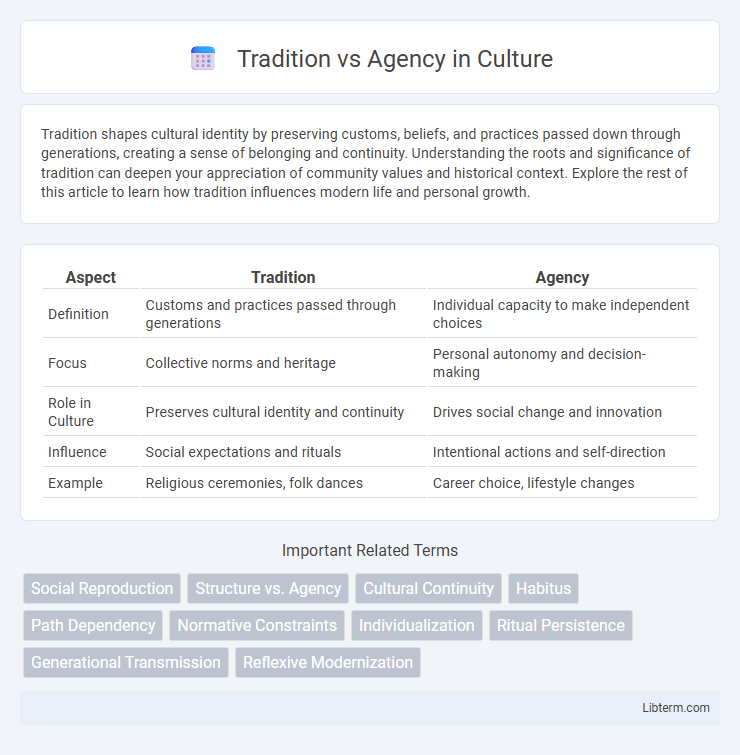Tradition shapes cultural identity by preserving customs, beliefs, and practices passed down through generations, creating a sense of belonging and continuity. Understanding the roots and significance of tradition can deepen your appreciation of community values and historical context. Explore the rest of this article to learn how tradition influences modern life and personal growth.
Table of Comparison
| Aspect | Tradition | Agency |
|---|---|---|
| Definition | Customs and practices passed through generations | Individual capacity to make independent choices |
| Focus | Collective norms and heritage | Personal autonomy and decision-making |
| Role in Culture | Preserves cultural identity and continuity | Drives social change and innovation |
| Influence | Social expectations and rituals | Intentional actions and self-direction |
| Example | Religious ceremonies, folk dances | Career choice, lifestyle changes |
Understanding Tradition: Foundations and Functions
Tradition serves as a foundation for cultural continuity, embedding inherited beliefs, rituals, and social practices that shape collective identity and social order. It functions as a stabilizing force, providing guidelines for behavior and reinforcing shared values across generations. Understanding tradition involves recognizing its role in preserving historical knowledge while influencing individual and group agency within socio-cultural contexts.
Defining Agency: The Power of Individual Choice
Agency represents the individual's capacity to make autonomous choices that shape their life outcomes, emphasizing personal empowerment over predetermined norms. This concept highlights the ability to act independently within or despite traditional social structures, thereby challenging fixed roles and expectations. Recognizing agency reveals how people navigate and sometimes transform established traditions through conscious decisions and actions.
Historical Perspectives on Tradition vs Agency
Historical perspectives on tradition versus agency emphasize the tension between established cultural norms and individual capacity to enact change. Scholars trace how traditions have shaped social structures, while agency highlights moments of resistance and innovation within historical contexts. This dynamic interplay reveals the evolving impact of human action on cultural continuity and transformation across time.
Cultural Influences on Agency and Tradition
Cultural influences shape both tradition and agency by embedding social norms and values that guide individual behavior within a community. Traditions represent collective customs passed down through generations, reinforcing identity and continuity, while agency reflects an individual's capacity to make choices that may challenge or adapt these inherited practices. The dynamic interplay between cultural traditions and personal agency underscores the balance between social conformity and self-determination in shaping human actions.
The Role of Tradition in Shaping Social Identity
Tradition plays a crucial role in shaping social identity by transmitting cultural values, norms, and practices across generations, fostering a sense of belonging and continuity within communities. It provides a framework through which individuals understand their roles, responsibilities, and relationships, thereby reinforcing collective identities and social cohesion. By anchoring identities in shared histories and rituals, tradition influences personal and group behavior, often balancing individual agency with established social expectations.
Agency in the Face of Societal Expectations
Agency in the face of societal expectations empowers individuals to make autonomous choices despite cultural norms and traditional constraints. This dynamic allows people to challenge established roles, assert personal identity, and drive social change by prioritizing self-determination over conformity. Understanding agency highlights the capacity for resilience and innovation within communities navigating rigid social structures.
Balancing Tradition and Agency in Modern Life
Balancing tradition and agency in modern life involves integrating cultural heritage with individual autonomy to create meaningful personal and social experiences. Embracing traditional values while exercising personal choice fosters resilience and adaptability amid rapid societal changes. This equilibrium supports identity formation, promotes social cohesion, and nurtures innovation within communities.
Tradition vs Agency in Contemporary Debates
Tradition and agency represent pivotal themes in contemporary debates about cultural identity and social change. Tradition embodies inherited customs and collective norms that shape community cohesion, while agency emphasizes individual autonomy and the capacity to challenge or transform established practices. Current discussions highlight the dynamic tension between preserving heritage and promoting personal freedom, reflecting evolving societal values and power structures.
Challenges and Conflicts: Navigating Between Tradition and Agency
Navigating the tension between tradition and agency often leads to conflicts as individuals strive to assert personal autonomy within prescribed cultural norms. Challenges arise when ingrained customs limit self-expression, creating a struggle to balance respect for heritage with the desire for change. Understanding these dynamics requires examining how social expectations influence decision-making and identity formation in diverse communities.
The Future of Tradition and Agency in a Changing World
The future of tradition and agency in a changing world hinges on the dynamic interplay between preserving cultural heritage and embracing individual autonomy. Emerging technologies and globalization accelerate shifts in societal norms, prompting adaptive reinterpretations of traditional values through personal agency. This evolving balance shapes identities and power structures, fostering innovation while honoring collective legacies.
Tradition Infographic

 libterm.com
libterm.com